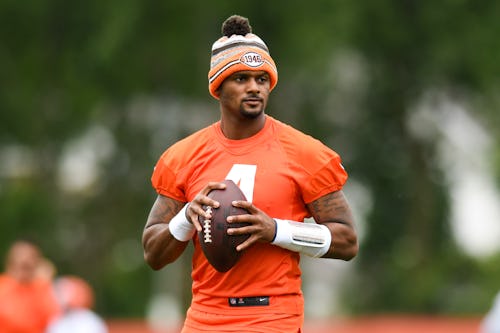
More than a year after the National Football League began its investigation into sexual misconduct allegations against Cleveland Browns quarterback Deshaun Watson, the punishment has been delivered: a six-game suspension, with no fine. Retired judge Sue L. Robinson was tasked with handing down the decision.
Watson has been credibly accused by more than two dozen women of harassing or assaulting them during their work as massage therapists in incidents dating back to 2020, during Watson’s time with the Houston Texans. While he has continued to deny the claims, 24 women have filed civil suits against him, each detailing a disturbing pattern of behavior that ranged from Watson exposing himself to him forcibly initiating sexual contact. Watson has since reached settlements with 23 of the 24 women who filed suit.
A six-game suspension is hardly a slap on the wrist for Watson, but given the NFL’s long history of disregarding and even rewarding players’ history of violence against women, it shouldn’t be a surprise.
Nearly a year to the day after the first civil suit against Watson was filed, he was traded from the Texans to the Browns with a fully guaranteed five-year, $230 million contract — the largest in NFL history. And after more women continued to come forward with their stories of Watson’s behavior, their lawyer, Tony Buzbee, announced that the Texans would be added to the lawsuits for enabling Watson.
Reporting by the New York Times revealed that Watson would use Instagram to find massage therapists, using team resources to make some of the appointments. The story also found that the Texans’ director of security also provided Watson with a nondisclosure agreement to use with clients. He began to take the NDA “to massages that same week, giving one … to a woman who said in her lawsuit that she ended the session after [Watson] suggested a sexual act. Watson told her she had to sign in order for him to pay.”
Last month, the Texans reached settlements with 30 of Watson’s accusers under confidential terms, though in a statement following the news, the team said the settlement was not “an admission of wrongdoing, but instead … a clear stand against sexual assault.”
Given the severity and volume of the allegations, the NFL was pushing for Watson to be suspended for a full year. But it was the NFL’s own past behavior that helped the NFL Player’s Association make the case for a lighter punishment. In 2019, the NFL declined to punish New England Patriots owner Robert Kraft when he was charged with solicitation of prostitution as part of an investigation into prostitution and human trafficking at Orchids of Asia Day Spa in Jupiter, Florida. (The charges were later dropped after a Florida appeals court ruled that key video evidence in the case was inadmissible). And earlier this year, the league declined to investigate voyeurism claims against a Dallas Cowboys senior executive.
If the league failed to take these claims seriously, the NFLPA argued, then why should Watson receive an unprecedented one-year suspension? It’s a valid question, though it’s what got Watson off the hook. Ultimately, it’s clear that until the league is willing to hold itself accountable, it doesn’t have the standing to punish its players. Watson has announced that he would not be appealing the decision; the NFL has three days to decide whether it wants to file its own appeal.
So, despite credible accusations from more than two dozen women, Watson will get to keep the vast majority of his historic $230 million contract (he will have to pay $333,000 for the six games he misses), he’ll eventually get back to playing, and according to reporters in Cleveland, he’s already getting cheers at the practice field.







